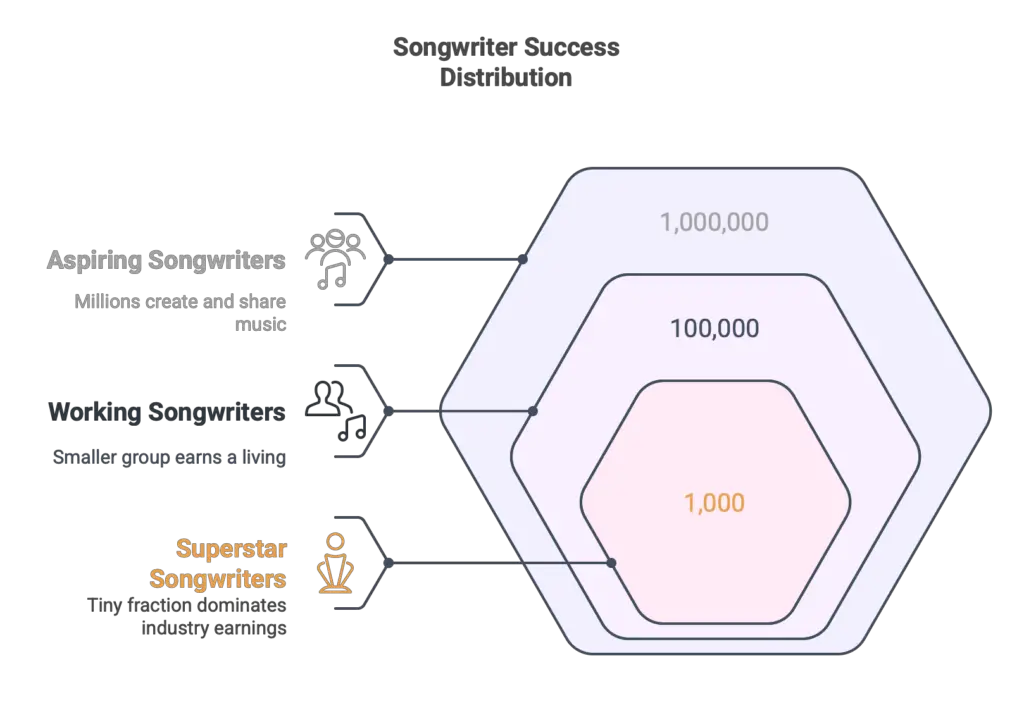“Should I quit music?”
If you’ve ever asked yourself this question, you’re not alone. Whether you’re a seasoned songwriter, a weekend warrior, or someone who’s just starting to explore your musical talents, the thought of walking away from music may have crossed your mind at some point – especially if you want to “make it” and have a fulfilling career in the field.
Here’s the thing: quitting Music™ (the career) doesn’t have to mean giving up on your passion of music (the hobby). Sometimes, it’s about redefining what music means to you.
So, you should ask yourself: is songwriting/music a hobby, a career, or something in between for you? Let’s break it down.
Improve your songwriting by mastering piano.
$49
ONLY
Winner-Take-All: Why the Music Business is so Challenging
Before we dive into whether you should actually quit music, I think it’s worth talking about WHY you might be frustrated in your music career.
Assuming you’ve taken a look at how much songwriters make, it’s easy to get disillusioned about your own path to success. But in all likelihood, it’s not your fault – it’s the very nature of the job.
Basically, the music business operates under an economic phenomenon called the “winner-take-all” market. Here’s the official (i.e. Wikipedia) definition of a winner-take-all market:
A market in which a product or service that is favored over the competitors, even if only slightly, receives a disproportionately large share of the revenues for that class of products or services.
In other words, if you want to make a fabulous living as a musician or songwriter, you need to be the best of the best – literally – to get rich at it. And if you want to make even a meager living in the music business, you still need to be among the best, at least.

For everyone else, you just aren’t going to make much money at it.
You’ve seen this type of distribution in action throughout your life in all kinds of sports and entertainment careers. For example, if you’re good at American football, but if you’re not one of the roughly 1,700 active players employed by one of 32 NFL teams, then you don’t have a viable football career – period.
In the world of popular music, the top 100 artists include individual men, women, and group acts, across a dozen different genres – and many of whom rose to fame decades ago. You could probably count the number of artists just like you in the top 100 on one hand.
That’s the problem: it’s extremely difficult to break into that elite group. In fact, other than a small number of newer pop stars like Post Malone, The Weeknd, Chappell Roan, and Sabrina Carpenter, a lot of the people on the list are the same who’ve been there forever. It’s not necessarily welcoming a lot of newcomers.
Balancing Music and a Marketing Career
As someone who’s performed live, released original music, and also pursued a successful career in marketing, I’ve wrestled with all of these questions myself. For me, music has always been a passion, but it hasn’t always been my paycheck – and that’s okay. (At least, it is to ME!)
I’ve seen firsthand that creativity doesn’t have to be all or nothing. By keeping music as a hobby, I’ve been able to enjoy the process of writing, recording, and performing without the pressure of turning it all into a career that would support me and my family. At the same time, my marketing work develops skills I can use to promote my music and connect with audiences in ways I couldn’t have otherwise.
In the back of my mind, I still have aspirations to write songs and find a wider audience for my creative work. But by having a sustainable career with decent pay (and the most important perk of all: infinite coffee in the break room!), I’m not pinning my family’s quality of life on how many streams my songs get.
That feels like a decent trade-off to me at this stage in my life. But I’m also in my 30s – if you’re currently in your teens or 20s, then you’re probably in a better position to take a risk on the music business.
Or if you’re older and finishing up your original career, and you’re not worried about your music paying the bills, then why not give it a shot? Just be realistic about what you’re getting into, and don’t get discouraged if it’s tough for a while.
With that in mind, let’s talk about your options if you’re contemplating quitting music.
1) Music as a Hobby: The Joy of Creating Without Pressure
Let’s start with the obvious: music doesn’t have to be your job to be meaningful. In fact, for many people, keeping music as a hobby is the reason they continue to love it.
I believe Johnny Depp famously wanted to be a musician, but ended up happy he became an actor, because it meant that music was a hobby he would continue to enjoy.
After all, any work you’re doing to pay the bills can easily stop being fun!
Why Music as a Hobby Works
- Creative Freedom: When music isn’t tied to your livelihood, you can experiment, take risks, and explore genres without worrying about commercial success.
- Stress Relief: Playing an instrument, writing songs, or even just listening to music can be a powerful way to unwind and recharge. (In fact, this is one of my favorite things about it!)
- Community: Joining a local band, attending open mics, or collaborating with other musicians can help you build connections and share your passion with like-minded people.
There’s something meaningful about doing something just because you love it. Even if only a small audience hears your music, it’s still worthwhile.
When to Keep Music as a Hobby
- You enjoy the process of creating music more than the idea of “making it big.”
- You have other career interests or responsibilities that take priority.
- You want to avoid the financial instability that often comes with pursuing music full-time.
You can’t do everything at once, and because of the realities of the music industry, you should only think of music as a career if you’re all-in on it.
2) Music as a Career: The Reality of Going Pro
Now, let’s talk about the other side of the coin: pursuing music as a career. While it can be incredibly rewarding, I think we all know it’s not for the faint of heart.
That’s one reason why some people decide it might be time to quit the music business.
Hard Truths About a Music Career
- Financial Challenges: Unless you’re one of those lucky (and talented) few, making a living from music often requires multiple income streams (such as teaching, gigging, producing, or even some non-music side hustles).
- Skill Diversification: Being a successful musician today means a lot more than just writing great songs. You’ll need skills in marketing, networking, and business. You’ll also likely need some level of technical proficiency in music production or audio engineering.
- Competition: The music industry is saturated with talent, just like any other wing of the entertainment business. Standing out requires not just skill, but also persistence and a healthy bit of luck. And with AI tools and social media at the ready, the amount of content is likely to keep growing exponentially.
When to Pursue Music as a Career
- You’re willing to put in the time, effort, and sacrifice required to build a sustainable career.
- You have a clear vision of what success actually looks like for you (including, touring, recording albums, or scoring films).
- You’re prepared to adapt and evolve as the industry changes.
If you can’t imagine doing anything else, and you’re willing to embrace the grind required to see success, then you should fully embrace a music career.
Key Questions to Ask Yourself
Still unsure whether to quit or keep going in music?
Here are a few questions to help you reflect:
- Does music bring you joy? If the answer is yes, quitting might not be the solution. Instead, consider how you can make music a sustainable part of your life.
- Are you willing to make sacrifices? Pursuing music as a career often means giving up stability, free time, and sometimes even personal relationships.
- What’s your “why?” Are you making music because you love it, or because you feel pressured to succeed? Your motivation matters.
Hobby or Career: 4 Steps to Help You Decide
If you’re still on the fence about whether to “quit” music, here are a few steps to help you make a decision:
- Set a Timeline: Give yourself a specific period (maybe 6 months or a year) to pursue your music goals consistently, either full-time or as a substantial “side hustle.” Reassess after that time frame.
- Explore Hybrid Careers: Consider careers that combine music with other skills, like music therapy, audio engineering, or music journalism. This allows you to work on your passion, but with a steadier paycheck.
- Talk to Other Musicians: Reach out to people who’ve walked this path before. Their experiences can offer valuable insights.
- Experiment: Try treating music as a hobby for a while and see how it feels. You might be surprised by how much you enjoy the freedom.
And last but not least, consider being open-minded about what happens next while focusing on your craft. Being so attached to a specific outcome – getting signed to a label, penning a #1 hit song, etc. – may be counterproductive.
A lot of the most successful people just do their best to get good at their art, and then… Who knows?
What to Know if You’re Going “Pro”
If you’ve decided you’re still committed to going pro as a songwriter or musician, I have one more bit of wisdom for you: treat your music career like a business.
This is the unsexy part for a lot of artistic types, but it’s true that most successful artists don’t fall into success by accident.
It’s a deliberate series of steps, from learning and improving at your work, but also:
- Legal – Understanding contracts and registering copyrights.
- Marketing – Promoting your work online and creating content.
- Business management – Setting up your business structure and tax deductions.
- Networking – Getting to know publishers, managers, and other artists.
- Revenue diversification – Monetizing your music with sync licensing, merch, royalties, and more.
If this is your livelihood, you can’t leave any of this to chance. You’re going to be in it for the long haul, and the journey will require plenty out of you before you’re successful.
But it’s an incredibly exciting and rewarding journey, as long as you’re committed to going the distance!
Final Thoughts: Should I Quit Music?
At the end of the day, the decision to quit music – or to keep going – is deeply personal. There’s no right or wrong answer, only what’s right for YOU.
But remember, quitting music as a career shouldn’t have to mean quitting music altogether!
Being a musician could mean strumming a guitar in your living room on a Wednesday night, or performing on stage in front of a small crowd each weekend. Music can always be a part of who you are.
And sometimes, letting go of the pressure to “make it” can be the best way to rediscover why you fell in love with music in the first place – and even lead you to the kind of success you wanted along.
So, should you quit music? Maybe. Or maybe you just need to redefine what it means to you.
In the end, music can be whatever you need it to be… And I think that’s worth holding onto. What do you think?
If you want to get better at writing memorable music that resonates, I recommend that you get familiar with an instrument like piano. The more you know about how great songs are constructed sonically, the easier it will be for you to create a masterpiece yourself. Check out Piano for All below to get started!
Improve your songwriting by mastering piano.
$49
ONLY






